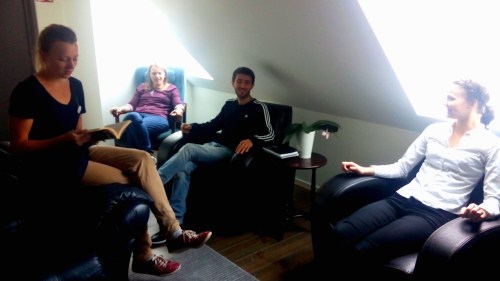
Maranata Community in Stockholm
How was Christian community of goods practically organized in the time of the Bible and how should it be organized today?
There are many myths and misconceptions about the apostolic church in Jerusalem and its community of goods. I’ve encountered people who think that all the disciples became homeless and unemployed as “those who owned land or houses sold them” (Acts 4:34), so that community of goods was more about having nothing in common rather than everything in common. In reality, however, they bought new houses after the resources were redistributed equally (8:3). Likewise, they probably bought new land and/or got other sources of income than agriculture.
The reason for doing this was most likely the fact that some people lived in quite luxurious homes while others were living in poor homes or even on the street. Selling everything and collecting the money in one pile under the oversight of the apostles made it possible for the church to provide a descent living for everybody, so that “there were no needy persons among them.” (4:34).
Now, we must remember that in the time of the New Testament there were no bank accounts. Everyone got paid in cash when they received their salary. This meant that even after the initial Great Selling of Everything, Christians in Jerusalem would receive their income individually (and most women, children and disabled people would not have any income at all).
This is why the apostolic church in Jerusalem had continuous support for widows as part of their community of goods (Acts 6:1-8). The collection or offering originated as the tool for managing community of income even after community of capital had already been established. For this reason, the fact that the church in Corinth needed to collect money from each individual in order to donate it to Jerusalem (1 Cor 16:1-4) is in and of itself not a contradiction to the Corinthians hypothetically living in community of goods. In a world without bank accounts, the church would need collections like that to manage individual income.
Matters are different in a community where all or most income are generated through the community’s own work, or when bank accounts exists and the community can use a common account for all members. This means that as far as I can see there are (at least) three different ways to organize community of goods today:
- Continuous Commitment Model: This is what I described above, the model of the early church. As community members continuously need to donate all their income to the common purse, commitment is a continual experience. However, there is also a risk of fraud as people have a greater possibility to hide money for themselves like Ananias and Sapphira (Acts 5)
- Centralized Work Model: All or most income is generated through community work, this is what I understand most monasteries use. All community members live in the same building and their work is located there as well, which makes it easy to have a physical common purse even for cash where all income is put as it is generated. This is practical, but it makes it harder for community members to have other jobs and generate income elsewhere.
- Common Bank Account Model: Every community member’s income is channeled to the bank account of the community which is managed by a treasurer. This is the model used by for example the Jesus Army. People can work wherever and the risk of theft is minor. However, in some countries it may not be possible that salary is transfered directly to the account of an association rather than to a person (this seems to be the case in Sweden).
I think these three models are equally good, the question is what works best in your context and what the Spirit is leading you too. No matter how the income is being put into the common purse, what’s important is that it is shared and that nobody has to suffer from poverty within the community.









[…] for community having ceased at that point, rather than that it was a necessary part of community in a society without bank accounts. Case argued that the poverty that Paul sought to relieve in Jerusalem in the 50’s was caused by […]
There is a British scholar called Brian Capper or Brian J. Capper who has written a lot about the community of goods of Jesus and his early followers. You might find it useful in thinking bout practicalities such as you suggest. His ideas about lengthy joining procedures as modelled first amongst the Essenes are all about thinking about practicalities, as you are doing.
Thank you for the tip, Steve!
[…] for community having ceased at that point, rather than that it was a necessary part of community in a society without bank accounts. Case argued that the poverty that Paul sought to relieve in Jerusalem in the 50’s was caused by […]